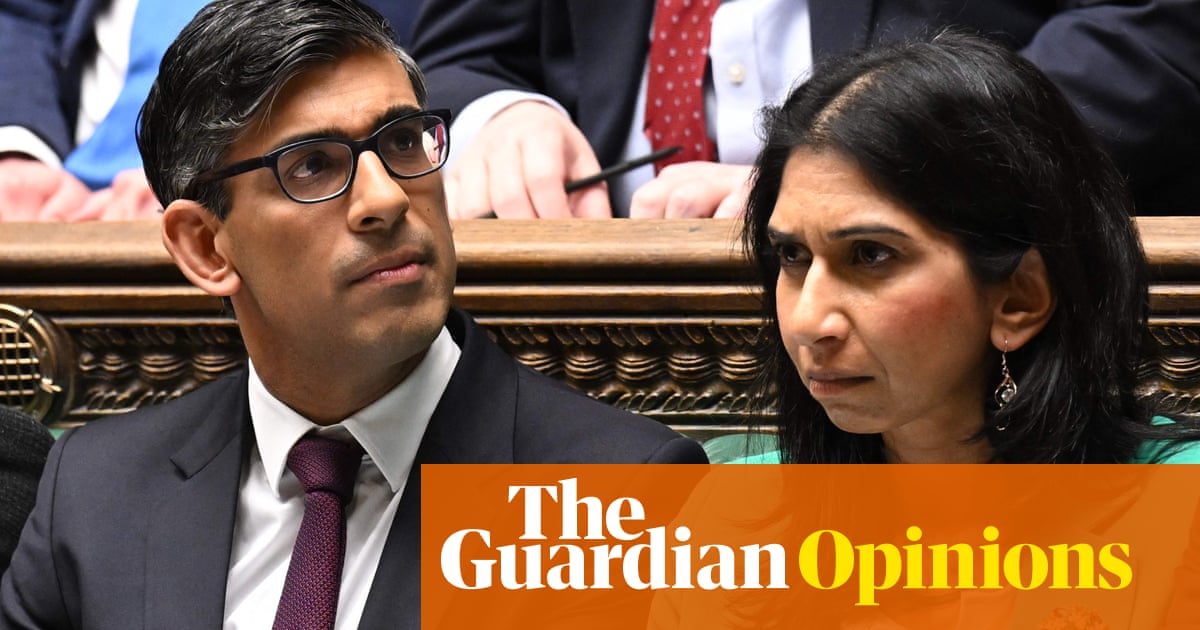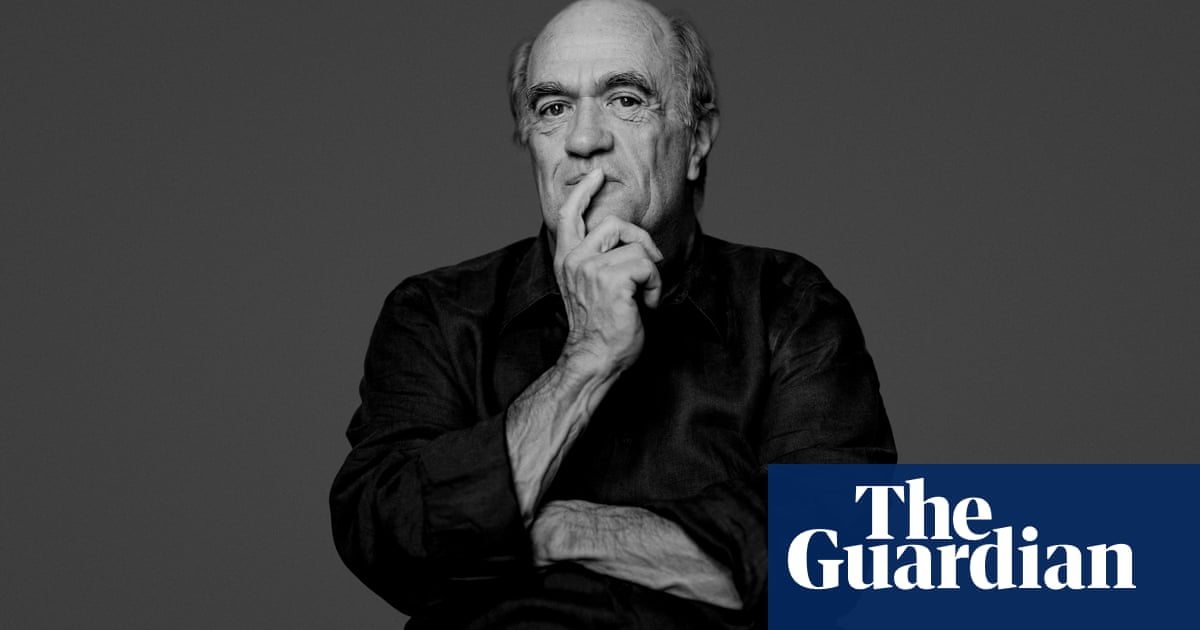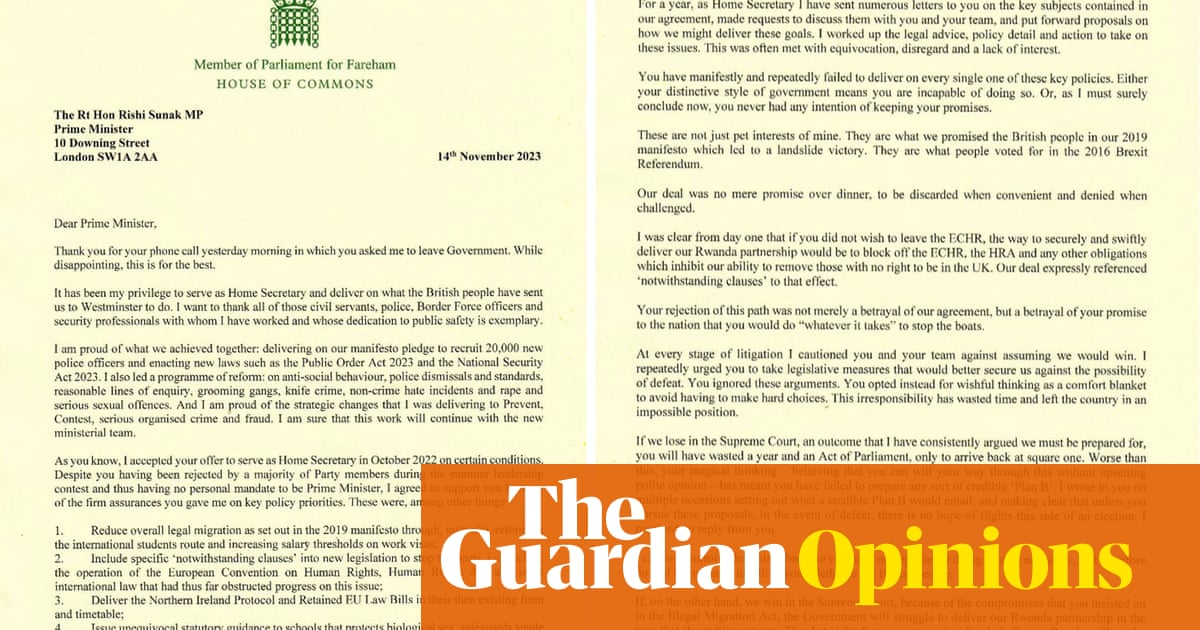
Rishi Sunak is good at not being Liz Truss. It is the quality that recommended him to Conservative MPs with an urgent vacancy to fill but it gives him only short-term credit with the public.
Sunak’s other credential is not being Boris Johnson. The new prime minister emphasised that much from the threshold of No 10. He promised “integrity, professionalism and accountability”, making traits that should come as standard sound like innovations. He also said he would “bring compassion” to Downing Street, acknowledging its absence under his predecessor.
Then he reappointed Suella Braverman as home secretary.
Braverman has failed adequately to explain the serial breaches of information security that got her sacked a fortnight ago. She is accused also of negligence and disregard for law, leading to horrendous overcrowding at a centre for asylum claimants in Kent. She defends herself with venomous deflection, blaming opposition MPs for conspiring to facilitate an “invasion” by foreigners who only pretend to be refugees.
That suggests a pretty low threshold of compassion and integrity for admission to Sunak’s cabinet, or that he plays with such words without knowing what they mean.
There was a crass political logic to bringing Braverman back; hardly chess grandmaster strategy. The theory was that the leadership candidate of the Tory hard right needed a seat at the top table as a reward for allowing Sunak’s accession. Accepting a cabinet emissary from the European Research Group was an ecumenical gesture to unite the party.
Perhaps Sunak also expects Braverman to fail and resign. Having discharged his obligations to the fanatical Faragist caucus on the Tory benches, the prime minister might then put the Home Office in more capable hands.
Whatever the calculation there is no scenario in which it looks good for the prime minister. Either he appointed a home secretary with a vicious demagogic streak knowing she is useless, in which case he has wilfully sabotaged one of the most important departments in Whitehall for no obvious gain, or he did it because he is blind to Braverman’s deficiencies, in which case he shares them.
Part of the explanation is Sunak’s lack of experience and interest in any aspect of government other than finance. He was a banker before he was a politician and, aside from a stint as a bag-carrier at the communities department, his ministerial rise was a vertical ascent through the Treasury.
He offers himself now as the nation’s accountant-in-chief, a budget hawk swooping in to rescue his party after it got stuck a fiscal hole. That is his comfort zone and also his brand strength. He has cultivated an image as the nerdy guy who kept the economy on the rails during the pandemic; the tidy teetotaller who pored over spreadsheets when a dishevelled Boris Johnson was pouring out the prosecco next door.
There is truth in that caricature, as Whitehall officials who have worked with Sunak testify. He is a diligent, details guy, which is what you want in a chancellor. But that is now Jeremy Hunt’s job. Sunak has acquired a bigger office but not yet expanded to fill it.
The delay is costing him credibility. He should, for example, have recognised that the Cop27 climate conference in Egypt was an opportunity on the world stage. Instead he saw it as a distraction from bean-counting and tried to wriggle out of it. Even if Sunak couldn’t feel any moral urgency about the climate crisis he might at least have sensed the expedient statecraft in appearing to care alongside Emmanuel Macron and Joe Biden.
The summer’s leadership contest against Truss forced Sunak to widen his range, but only in the direction of a Tory grassroots comfort zone. On immigration policy, he promised to toughen up the already vindictive and ineffective Rwanda deportation scheme. He pledged to resist any interference by the European court of human rights. He described the 2010 Equalities Act as “Trojan horse” legislation, exploited by “lefty woke culture that seems to want to cancel our history, our values and our women”.
It wasn’t clear how much of that was sincere illiberalism and how much was display to woo Conservative crowds. Sunak felt the need to dispel wariness of the slick cosmopolitan style that had a whiff of remain, despite the fact he voted leave in 2016.
If the outcome is commitment to policies that can’t work, it doesn’t really matter whether the prime minister does it from conviction or cynicism. Sunak might not even know the difference if, like Truss and Johnson, his beliefs are offshoots of ambition, bent to the goal of acquiring and maintaining power.
To that end, the Downing Street strategy looks like a hybrid of budget austerity, appealing to traditional, fiscal conservatives, and a Brexity border fixation to lock in those voters from former Labour heartlands who were more recently recruited to the Tory cause.
A flaw in the plan is that the economics and politics pull in different directions. Populist rhetoric without public spending is a way to stir public frustration, while advertising the government’s impotence. That is especially dangerous with migration. If Sunak isn’t disturbed by the indecency of rhetoric that casts refugees as an army of criminal infiltrators, he might at least fret that it is electorally self-defeating for his party.
No migration policy will satisfy the right. That is the obvious lesson from 12 years of Conservative rule. The ERG and the Ukip tendency (now rebadged as “red wall” Tories) got everything they had always wanted in Brexit, and they want more. They always want more. They cannot be placated with targets or crackdowns. Those things only prove that the system is failing and stoke the appetite for more draconian measures.
It was the trap that David Cameron walked into on the day he entered Downing Street, thinking he could buy loyalty from people who treated him as a hostage not a leader. They banked his concessions and upped the ransom demands.
Maybe that is why I struggle to think of Sunak as a really “new” prime minister. He feels too much like a sequel in a tired franchise, or the remake of a movie that was hardly a classic the first time.
There are cast changes, but also familiar characters. Sunak has much the same aura of patronising prosperity that Cameron brought to the job. Michael Gove and Hunt are back in the cabinet. George Osborne is said to be chipping in with informal political advice. Nigel Farage is still invigilating whiteness at the cliffs of Dover.
Austerity in the Treasury; a hostile environment at the Home Office. After 12 years and four prime ministers, British politics has cycled back to where it started, but that much meaner and poorer. All for what? Where did the journey take us? To Brexit, to rage, to division and economic downgrade. A dozen years wasted. A crusade whipped up by nationalist zealots to a holy land that doesn’t exist to fight an enemy that was actually our friend, defeating no one but ourselves.
Rafael Behr is a Guardian columnist












